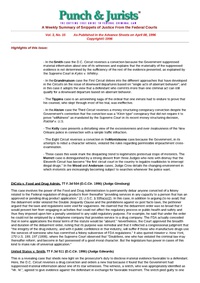This is a revealing case that sheds new light on the prosecutor's duty to disclose material evidence favorable to a defendant. Here, the D.C. Circuit reverses a drug conviction and orders a new trial because it found that the Government had suppressed material information about one of its star …
This is one of those cadaverous comedies brought to us by the inimitable police force of New Orleans. The plaintiff, a tourist, was stopped by a policeman for making an illegal left turn. She was promptly hauled off to jail, where she remained for the next eleven hours. But …
What distinguishes this otherwise rather mundane drug conviction appeal is the reprise of some harsh criticism of the Guidelines originally voiced by Judge Rhoades in U.S. v. Kuhl, 816 F.Supp. 623 (S.D.Cal. 1993). In this decision, Judge Rhoades bluntly observes: "Anyone who believes that the guidelines are any more …
This case deals with the Government's continuing efforts to chip away at the Supreme Court's holding in Ratzlaf v. U.S., 126 L.Ed.2d 615 (1994). The defendant was convicted of two counts: a conspiracy to defraud the U.S. Government under 18 U.S.C. § 371; and money structuring under 31 U.S.C. …
Over the strong dissent of three judges, the Eleventh Circuit refused to rehear its previous decision upholding the validity of temporary, unannounced roadblocks established on the pretext of ensuring compliance with traffic related laws.
Merrett v. Moore, 77 F.3d 1304 (11th Cir. 1996) (Per curiam) (En banc)
United …
This decision reviews an important, but frequently misunderstood, limitation on the prosecution's ability to present impeachment evidence in response to a defendant's introduction of "character evidence." Under the Rule 404(a)(1) of the Federal Rules of Evidence, evidence of a person's character is generally not admissible for the purposes of …
This case involves the power of the Food and Drug Administration to permanently debar anyone convicted of a felony related to the Federal regulation of drug products from thereafter "providing services in any capacity to a person that has an approved or pending drug product application." 21 U.S.C. § …
This is one of those crazy cases from la-la land that sorely tests the credibility (or gullibility) of the criminal justice system. It involves the tale of a sleepy lawyer and a perspicacious judge. The defendant, Dale Tippins, was convicted in a State court, way back in 1986, of …
Here the Court rejected a challenge that Congress had exceeded its authority under the Commerce Clause when it enacted 18 USC § 922(d).
In this case the First Circuit adopted the minority view that the proper test for determining whether a defendant is entitled to a downward departure based on "aberrant conduct" is the "totality of circumstances standards - not a "spontaneous act".
This is an important case from the First …
QUOTE OF THE WEEK - Few statements in the annals of American jurisprudence more accu rately summarize the evils of ignoring the protections of the Fourth Amendment than the following statement of Justice Jackson, who described the impact of unlawful searches with these words:
"Among deprivations of right, none …
Case held that exceptional community or charitable activities may provide a basis for departure under the Guidelines.
